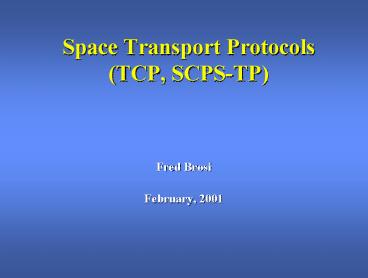Space Transport Protocols TCP, SCPSTP - PowerPoint PPT Presentation
1 / 13
Title:
Space Transport Protocols TCP, SCPSTP
Description:
The Space Communications Protocol Standards (SCPS) project was developed to ... include GEO, HEO, and LEO (including constellations such as SDI and Teledesic) ... – PowerPoint PPT presentation
Number of Views:970
Avg rating:5.0/5.0
Title: Space Transport Protocols TCP, SCPSTP
1
Space Transport Protocols (TCP, SCPS-TP)
- Fred Brosi
- February, 2001
2
What is SCPS?
- The Space Communications Protocol Standards
(SCPS) project was developed to improve
communications performance in a satellite
environment - Intended environments include GEO, HEO, and LEO
(including constellations such as SDI and
Teledesic) - SCPS extended the internet protocol suite
3
SCPS extends the internet protocol suite
Internet Stack
OSI Stack
Sample Protocols
7
Application
FTP, SCPS-FP
Application
Presentation
6
Session
5
TCP, SCPS-TP
End-to-End
Transport
4
IPSEC, SCPS-SP
3.5
IP, SCPS-NP
Internetwork
Network
3
Network Access
Various protocols (e.g., CCSDS commercial,
military)
Data Link
2
1
Physical
4
SCPS Capabilities
Record read record update
Core
File record Integrity
Automatic restart
Interoperable
/-
User suspend/resume
Internet FTP
Suppress ASCII reply codes.
SCPS FILE TRANSFER PROTOCOL
7
Congestion control appropriate formixed-loss
environments (congestion, corruption,
outage) Selective negative acknowledgment Robust
header compression Window scaling (long/fat
pipes) Partial Reliability service
(BETS) Delimitation of record boundaries Timesta
mping for high ratesequencing, delay measurement.
(SCPS-FP)
(Optional)
Core
Interoperable
SCPS TRANSPORT PROTOCOL
/-
Internet
4
(SCPS-TP)
TCP/UDP
SCPS SECURITY PROTOCOL
3.5
(SCPS-SP)
(Optional)
Authentication guarantee of the identity of a
source Access Control prevention of
unauthorized access Integrity protection
against modification Confidentiality protection
from disclosure.
SCPS NETWORK PROTOCOL
3
(SCPS-NP)
(Optional)
Provide both connectionless and managed-
connection routing Support precedence
(priority) based handling Offer multiple routing
options Signal errors to the layer
above Support packet lifetime control Scaleable
- tailor capability to need, e.g.,
highcommunications efficiency in
constrainedbandwidth conditions.
2
Underlying Link Protocol
SCPS sits on top of existing link capabilities,
and augments them
5
When does the Internet stack have problems?
- When there is loss due to sources other than
congestion - When there are shorter round trip times in the
network than yours (other users recover fast and
get first in line) - When sessions span spacecraft contacts or require
handovers between ground stations (intentionally
or unintentionally) - When systems support varying bandwidthdelay
products - When there is significant bandwidth asymmetry
- When there is limited bandwidth, CPU, or memory
6
What basic extensions to TCP does SCPS make?
- Selective NACK for faster, bit-efficient loss
recovery - Loss-tolerant congestion control
- Rate control (with or in lieu of congestion
control) - Loss-tolerant header compression
- Partial reliability service
- Ability to use SCPS-SP and/or SCPS-NP and/or IP
- Retains interoperability with standard TCP
its extensions
7
The SCPS Transport Protocol (SCPS-TP)
- Transport protocols support end-to-end
communication only active at end points - SCPS-TP is Internet TCP and UDP, plus extensions
- SCPS extensions improve operation in the space
environment - Result end-to-end communication and reliability
to suit mission requirements
8
Requirements for Reliable Data Transfer
- Support for end to end data transfer
- Transfer with full reliability (complete,
correct, in sequence, no duplication) - Uplink for command and table loads
- Downlink for compressed data transfer
- Transfer with best effort reliability (correct,
in sequence, no duplication, possibly with gaps) - For transfer of telemetry, image data, etc.
- Transfer with minimal reliability (correct,
possibly incomplete, possibly out of sequence) - Minimal reliability must support multicast
operation - Other requirements address priority, etc.
1993 SCPS Exploratory Study
9
Factors affecting use of TCP in terrestrial and
spacecraft communication environments
10
Modifications to TCP to support spacecraft
communication environments
11
Things to remember about SCPS-TP
- SCPS-TP is TCP and UDP with modifications to suit
the spacecraft communications environment - Depending on configuration options selected,
SCPS-TP can be less than TCP, identical to TCP,
or a super-set of TCP - Mission requirements dictate which options are
selected - A few profiles (2 or 3) will cover the majority
of mission classes
12
SCPS File Transfer Protocol (SCPS-FP)
- Files are named collections of data - could be
in memory, mass storage, etc. - File transfer protocols coordinate movement of
files (or parts of files) between systems - SCPS-FP is derived from FTP
- Extensions support movement of file records,
addition of integrity checking, and
interrupt/restart support
13
SCPS-FP is Internet FTP With Extensions
- SCPS-FP extensions to Internet FTP include
- Record Read
- Record Update
- Autorestart
- Manual Interrupt
- Suppression of Reply Text































